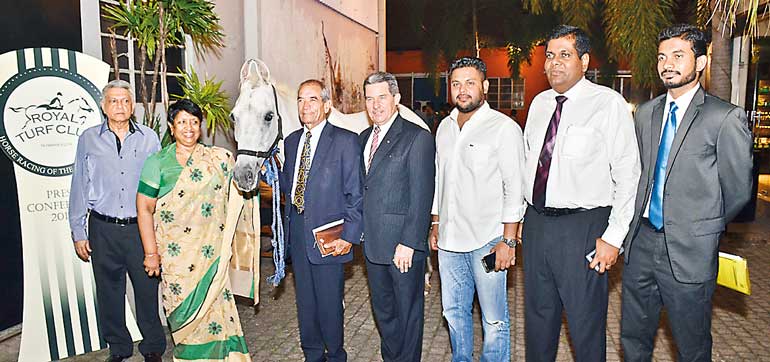Friday Feb 27, 2026
Friday Feb 27, 2026
Thursday, 11 February 2016 00:26 - - {{hitsCtrl.values.hits}}

“Horse racing, the gentleman’s sport will be restored to its former glory with the formation of the Royal Turf Club,” promised Wayne Wood, inaugural Chief Executive Officer and Chairman of Stipendiary Stewards of the RTC, addressing a packed media briefing held to officially launch the RTC.
Woods along with Sinclair Marshall, who takes up the position of Thoroughbred Riding Instructor and Stipendiary Steward of the RTC, have been brought in to help the RTC showcase horse racing in Sri Lanka at the highest level.
“With our backgrounds we have a great understanding of racing from the eye of all participants. We will conduct inquiries according to the highest standards of professionalism, effectiveness and natural justice. We shall improve the services to racing participants, and look to establish a racing school to educate young riders,” added Woods.
Woods was also vehement in his affirmation of the fact that the manipulation of horse racing rules and misconduct on the race course, where doping of horses and other unethical practices held sway, were now a thing of the past.
“We have compliance programs for animal welfare, and licensing for trainers and jockeys, and in the future owners as well. We will look at race day surveillance, which will include a drug control programme for horses. This will be along the same lines as the Asian Racing Federation,” he explained.
Marshall meanwhile said he was delighted to be in Sri Lanka and be part of the team responsible for establishing Sri Lanka as a regional hub for horse racing. Marshall has ridden 8 Derby winners, while he was Champion Jockey on several occasions in the Bombay, Pune, Madras and Mysore Turf Clubs.
Headed by equestrian Suranjith Premadasa, who is the President of the Royal Turf Club, the other office bearers of the Royal Turf Club (RTC) are Secretary Lucille Dahanayake and Treasurer Nishitha Rupasinghe, while the Committee comprises of Ranjith Dahanayake, Nihara Jayatilleke and Sudarshana Deshapriya.
Horse racing was first introduced to Sri Lanka in the 1840s by John Baker, with the inaugural race taking place at the Nuwara Eliya Race Course in 1875. In 1910, then Governor of Ceylon Sir Henry Edward McCallum, inaugurated the prestigious Governor’s Cup as well as the Queen’s Cup. During the early 1950s Ceylon horse racing was at its peak and in fact took pride of place in the entire region.
In 2000 the Ministry of Sports took over the ownership of the Nuwara Eliya Race Course and thereafter, to date it has been managed by the Sugathadasa National Sports Complex Authority, under the Ministry of Sports.
The Nuwara Eliya Race Course has a circumference of 1800 metres and is situated at 1868 metres above sea level, in what has proven to be one of the most scenic tracks in the entire region.
It is the mandate of the RTC to restore the sport of horse racing to its former traditions of gentlemanly conduct and establish it not merely as a sporting activity in Sri Lanka, but to make the Nuwara Eliya Race course the hub of regional horse racing activity, hence promoting Sports Tourism.
The RTC have made all the necessary arrangements to establish horse racing as one of the country’s premier sports, adhering to international norms and standards. RTC goes with the motto of “Horse racing at the highest level” which demonstrates the altitude and also has the meaning of the highest integrity. The forthcoming 2016 season in Nuwara Eliya will see the first race being held on 20th March.
The Royal Turf Club have to date made a size-able investment to develop the infrastructure, which includes renovating the track and replacing the track railings, renovating the Grand Stand, Steward Room, Jockey’s Rooms, as well as all other Race Course buildings which were in need of extensive repairs. The RTC intends to continue with its program of development by investing over the next two years, in partnership with foreign investors, to make Sri Lanka and Nuwara Eliya a racing hub for the region.